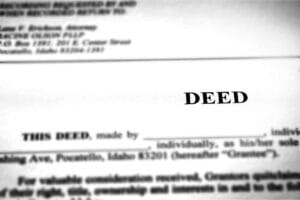Land is wealth. We see this principle throughout the world, where people either buy land or conquer others and take it. The principle behind this is that if you have land, you possess a valuable, finite resource. When you own land, you can do many things with it to generate revenue and build wealth. You can construct homes, grow crops, and establish businesses. Because of these reasons, buying land in Ghana as a diasporan can be one of the most lucrative ventures. It gives you a piece of Ghana that you can use to establish yourself in the country.
However, purchasing land in Ghana can be very risky. If you don’t follow the right process, it’s easy to get scammed and lose all your money. Luckily, if you follow the proper procedures, you’ll be able to acquire land almost risk-free. In this blog post, we will look at how to acquire land in Ghana without getting scammed. We’ll cover everything from working with a real estate agent to the most common land scam trends. Let’s learn about beautiful Ghana, bit by bit.
Why Consider Buying Land in Ghana
Ghana is a booming economy with a lot of opportunities. There are more and more people in need of property to either build homes or establish businesses. Because of this, there has been growing competition for an already finite amount of land. As a result, when you acquire land in Ghana, you can be assured that your decision can be worthwhile. Not only that, land in Ghana is on the more affordable side.
I remember one time I wanted to acquire some agricultural land in an area called Agona East. Surprisingly, this land was being sold for $1,500 CAD per acre. The price is so attractive that it makes buying land in Ghana make sense. This would be what you pay for taxes on your land for a few months in North America.
For the African Diaspora, buying land in Ghana can be a helpful way to invest in the economy and also reconnect with your home. Imagine owning a piece of real estate in Ghana that you paid much less for compared to what you would pay in North America. However, buying land comes with avoidable risks. The key term here is avoidable. Though the process is not always straightforward, you can exercise enough caution to successfully acquire a piece of Ghana.
Common Scams When Buying Land in Ghana
While going through the land-buying process for the land I mentioned earlier, I learned about some common risks. I was working with a real estate agent, so he was able to explain in detail some common do’s and don’ts. One of the most common scams when purchasing land in Ghana is buying property that has already been sold to someone else. Another is buying land that is in litigation. Let’s look deeper into the common scams you must watch out for, and how to avoid them.
1. Fake Land Titles and Fraudulent Sellers
Using fake and forged titles is a common trend among scammers. This is one of the most common land scams that you must be careful to avoid. In some cases, individuals or groups may present fraudulent documents that appear legitimate, only for the buyer to later discover that the land does not belong to the seller. The title might also not be registered with the Lands Commission.
How to Avoid This Scam: Always verify the land’s title with the Lands Commission. This is something the real estate agent drilled into me, along with a business partner I was working with. The Lands Commission is the government body responsible for land registration in Ghana. You should also request to see the original land title and compare it with the official records. It’s advisable to work with a lawyer who is familiar with Ghanaian land law to ensure that the title is genuine. A good real estate agent might also be able to do this.
2. Land With Multiple Owners
Another common trend among scammers is selling you land that has multiple owners. This land might be family land divided among siblings, and all these siblings might have claims on the land. You must be vigilant to ensure you don’t end up in a situation like this. Another way this can happen is if the land is not subdivided properly or if there is no clear documentation of ownership. Who knows? The seller might not even have legal rights to the land in question.
How to Avoid This Scam: To avoid this scam, be sure to conduct thorough research on the land’s ownership history during your land-buying process. This is another area where a real estate agent can help. You might also be able to work with trusted locals who can guide you smoothly through the process.
This research can be done by visiting the Lands Commission to obtain a land search report, which will reveal any disputes or competing claims regarding the property. You can also speak to neighboring landowners and community leaders to confirm the ownership status.
3. Selling Land Without Proper Documentation

Some landowners might try to sell you land without proper documentation. Common land documents to look for include land certificates and building permits. If you purchase land in a situation like this, you could be drawn into a lengthy litigation process. Worse yet, you might not be able to develop or use the land for your intended purpose.
How to Avoid This Scam: To avoid this scam, ensure that the land you are buying has the proper documentation. Check all necessary approvals from local authorities and verify that they are up to date. If the land lacks official documents or permits, move on—there are plenty of properties for sale in Ghana. Again, a reputable real estate agent can help verify the documents before any payments are made.
4. Overlapping Land Sales
Some sellers try to sell the same piece of land to multiple buyers, often collecting payments from several parties. When this happens, you may have to go through the courts to claim the property—or worse, you may never recover your money.
How to Avoid This Scam: Conduct thorough research to ensure the seller is the sole owner of the land. Be cautious of land prices that seem too low—they might be too good to be true. Additionally, never make full payments upfront without proper documentation or legal representation.
5. Land Near Protected or Government-Owned Areas
If you purchase land near government-owned or protected areas, you might be in for a big surprise. Some scammers try to sell land located in protected zones like forests or reserves. Be diligent when buying land in Ghana to ensure this doesn’t happen. If you buy such land, you may not be able to develop or use it for your intended purpose.
How to Avoid This Scam: To avoid this scam, check the land’s location against official maps of government-owned properties or protected zones. The Lands Commission can be very helpful in this process.
Steps to Take When Buying Land in Ghana
I have touched on the most common scams to look for when buying land in Ghana. There might be others, but these are the most common ones. Now that we have gone through these, let’s look at the steps you must take to actually acquire a piece of Ghana.
1. Engage a Professional Real Estate Lawyer
Like most places in the world, working with a real estate lawyer is a necessary step to purchase land in Ghana. This will facilitate the land transfer process and ensure that the transaction runs smoothly. A good lawyer will be able to help you navigate any legal complexities, and verify official documents.
2. Perform a Land Search at the Lands Commission
This step is very crucial for many reasons. A search at the Lands Commission will help you confirm the ownership of the land and check for any existing encumbrances. This step will ensure there are no competing claims. It will be a good thing to request a copy of the land’s records to cross-check the details provided by the seller.
3. Verify the Seller’s Identity and Ownership

Now it’s time to verify that the seller is the rightful owner of the land. Ask for identification and cross-check it with the land documents at hand. If the seller claims to represent a family or a group, you must obtain documentation proving their authority to sell the land. Always be cautious of sellers who are reluctant to provide such documents.
4. Check the Land’s Accessibility and Location
Ensure that the land is accessible and that it is in a location that aligns with your goals. Visit the property in person to assess the terrain and confirm its boundaries. If the land is undeveloped, make sure it has proper access roads and utilities.
5. Avoid Making Full Payment Until Everything is Confirmed
Never make full payment for land until you are certain everything is in order. You may want to negotiate a deposit and ensure that the balance is paid after all legal documents and approvals are confirmed. This will help protect your investment and minimize the risk of fraud.
Conclusion
Buying land in Ghana is an exciting investment opportunity, but it is not without its own set of risks. Unfortunately, scams are common, and the consequences of falling victim can be costly. By following the steps outlined in this guide, you’ll be able to acquire your land while avoiding risks. conducting a thorough land search, working with legal professionals, and verifying ownership are just some of the steps to take to secure your purchase.
I am very excited for you, that you are either in the process, or looking into buying land in Ghana. Whether you are buying land for residential, commercial, or agricultural purposes, taking the proper precautions is essential. With due diligence and vigilance, you can enjoy the rewards of owning land this beautiful West African paradise. Best regards, and stay well.











